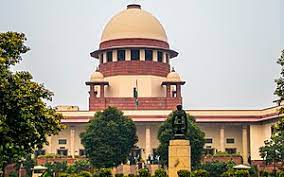New Delhi: Despite the Supreme Court’s stern criticism of Haryana and Punjab for their inadequate measures against stubble burning, several incidents of this practice were reported in the 2 states.
The stubble burning was observed in Kaithal district and along the Karnal-Jind road. In Punjab, similar occurrences were noted in Hardo Putli village in Amritsar and Handiaya village in Barnala.
Stubble burning, the practice of setting fire to crop residues, significantly contributes to air pollution, releasing hazardous smoke that deteriorates air quality.
On October 23, the Supreme Court criticized both state governments for failing to effectively address this issue, underscoring that every citizen has a fundamental right to a clean and pollution-free environment.
The bench, comprising Justices Abhay S. Oka, Ahsanuddin Amanullah, and Augustine George Masih, expressed discontent over the lack of enforcement actions against stubble burning. They highlighted that only nominal fines were being imposed, questioning the sincerity of the state governments in enforcing the law.
“If the Punjab and Haryana governments were genuinely interested in enforcing the law, there would have been at least one prosecution,” the bench remarked.
The court’s remarks were made during hearings concerning air pollution in the region. It has scheduled further discussions on pollution sources post-Diwali, intending to address pollution from transportation, industries, heavy truck entries, and open garbage burning in Delhi and its surroundings.
In response to the air quality crisis, Haryana Chief Minister Nayab Singh Saini announced a financial incentive of Rs 1,000 per acre for farmers who refrain from burning stubble.
He stated, “Our government
On October 21, farmers in Punjab called on the government to find a lasting solution to the stubble-burning problem, expressing that this practice has become a compulsion for many.
The ongoing debate underscores the urgent need for effective policies and actions to mitigate the environmental impact of stubble burning and improve air quality in the region.
Stubble burning persists in states despite SC’s rebuke
इस शब्द का अर्थ जानिये
- Advertisement -

